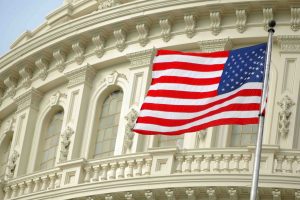The pace of policy news has been rapid with significant developments impacting research, online protections for children, and broader digital regulations. Since taking office, President Trump has signed a series of executive orders and has ordered significant budget cuts, some of which could have far reaching impacts for child safety and technology policy. Actions include:
-
- Federal Funding Freeze and Research Disruptions
Imposed a temporary freeze on federal funding for research grants and education programs. Subsequently a federal judge blocked the order. Additionally, a communications freeze at the National Institutes of Health temporarily halted many grant review processes.
-
- Artificial Intelligence Executive Order
An executive order intended to facilitate American leadership in artificial intelligence repealed Biden-era AI policies and mandated an AI action plan to develop systems free from ideological bias, while maintaining American leadership in AI development to “promote human flourishing, economic competitiveness, and national security.”
-
- Changes to the Department of Education
The Institute of Education Sciences (IES), the independent research branch of the Department of Education, underwent large-scale cuts including the elimination of many of its contracts. IES has funded projects such as using AI to aid reading instruction and develop interventions to improve student attention.
Federal Trade Commission Updates COPPA Rules
The Children’s Online Privacy Protection Act (COPPA) remains the only federal law protecting children online in the United States. Passed in 1998, the rules enforcing COPPA are updated approximately every 10 years. The Federal Trade Commission (FTC) recently released their latest changes to the rule. According to the FTC, the new rule “requires parents to opt in to third-party advertising and includes other changes to address the emerging ways that consumers’ data is collected and used by companies, and particularly how children’s data is being shared and monetized.” Last year, Children and Screens submitted comments in response to the FTC request for public input regarding their proposed COPPA rulemaking.
Congressional Leadership and Legislative Activity
Key congressional committees have chosen their membership.
-
- The House Energy and Commerce Committee
Chaired by Representative Brett Guthrie (R-KY), this committee has primary jurisdiction over child online safety legislation in the House. Rep. Guthrie has already signalled an interest in advancing privacy and kids’ online safety legislation. It is expected that the committee will hold a subcommittee hearing on online safety issues next week.
-
- Senate Commerce Committee
Chaired by Senator Ted Cruz (R-TX), the committee is positioned to take action on a number of online protections.
-
-
- The Take It Down Act (co-sponsored by Senator Amy Klobuchar (D-MN), which would criminalize the sharing of non-consensual intimate imagery, including deepfakes, and require social media companies to implement content removal processes.
- The Kids Off Social Media Act (KOSMA) (co-sponsored with Senators Brian Schatz (D-HI), Chris Murphy (D-CT), Katie Britt (R-AL), which would ban children under age 13 from social media and prohibit the use of algorithmic recommendations for children under 17.
-
While Congress has spent much of the current session focused on funding the government and top Trump Administration priorities, lawmakers continue to introduce and advance key bills aimed at regulating digital platforms.
Reintroduced on March 4 by Senators Bill Cassidy (R-LA) and Ed Markey’s (D-MA), COPPA 2.0 would extend privacy protections under the existing Children’s Online Privacy Protection Act protections beyond children under age 13 to include teenagers, while also implementing stronger data protections.
-
- The Kids Online Safety Act (KOSA)
Last year, Senators Marsha Blackburn (R-TN) and Richard Blumenthal (D-CT) introduced KOSA. Both KOSA and COPPA 2.0 passed a full Senate vote and advanced out of the House Energy and Commerce committee, but neither made it to the House floor for a final vote. Senator sponsors vowed to reintroduce KOSA early this Congress. Any legislation will ultimately need the approval of Speaker Mike Johnson (R-LA) and Senate Majority leader John Thune (R-SD).
Other Trends in Online Regulation
In the absence of comprehensive federal digital reforms, states continue to pass legislation attempting to regulate online spaces. Just this month, the Utah legislature passed S.B. 142 (App Store Accountability Act) which would require app stores to verify users’ age. These legislative efforts are unfolding against a backdrop of growing legal challenges to state-level regulations, increasing school cellphone bans, and significant international developments, including an Australian school mobile device ban and social media ban for minors, and the recent AI Action Summit in Paris, France.

